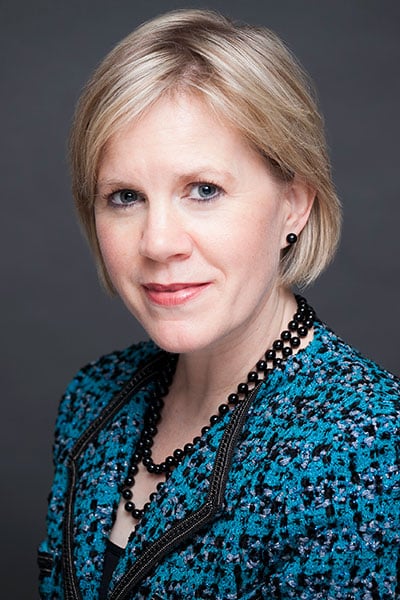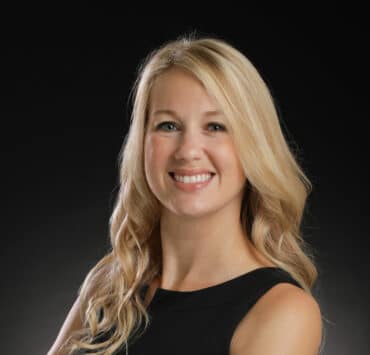There is a strong chord between teaching and litigation. Amy Sellars, assistant general counsel and director of the Discovery Center of Excellence at Cardinal Health, found that harmony and calls it “the search for the truth.”
Sellars began her career in the classroom, teaching English and theater to high school students. She initially pursued a career as a teacher of these subjects because she loves narratives. After a bit of “disenchantment” with the United States education system, Sellars began working for an education tech start-up, where she first felt the spark to pursue law.

The nonprofit was a company dedicated to improving teaching in Title I schools. Schools classify as Title I if 40 percent of the students they serve are below the poverty line, and these institutions are part of a federal program that provides funding. The company Sellars worked for was also federally funded, and with that came a lot of reporting requirements.
“I spent a lot of time trying to figure out how all of our project managers and education subject matter experts were going to gather data, and how we were going to track that data and report on that data,” Sellars says about her time spent at the nonprofit. While this was not the role she intended to have when beginning her work there, she realized her talent for it.
“I also realized that data was telling stories,” Sellars adds, “that data made us rethink the things we thought we knew. When I went to law school, I really thought I was going to go into education law—I thought I was just extending the place that I started.”
Instead, Sellars instead found that there were many narratives to tell and problems that data could solve as the driver of these stories. After taking her first course in electronic discovery, or e-discovery, she says, “I realized this was an incredible combination of my love of stories and my interest and capability with data and databases. And that was it. I didn’t look back at education law again.”
Yet what Sellars learned during her time spent in education was not for naught. “Being a teacher means that you’re sort of unflappable. When you’re staring down thirty-five high schoolers who don’t really want to talk about Romeo and Juliet, you become able to survive almost anything, I’d say,” she says, laughing. “So [teaching] has taught me that you have rely on your passion, especially when you are talking about something that someone may not understand.”
Being unflappable is an imperative skill for a litigator, but as an attorney in the healthcare industry, where things are constantly changing, the flexibility learned at the helm of a high school class has also given her a leg up. “When you talk about flexible—when you talk about how we bounce back when things don’t work out—there is no better training for dusting yourself off and starting over again than being a teacher,” Sellars says.
In healthcare, this knack for trial and error enables evidence-based learning and processes. So Sellars’s entrance to the industry was an easy transition. Cardinal Health is a multinational healthcare services company, and according to Sellars, “a healthcare enablement company.”
“When you talk about flexible—when you talk about how we bounce back when things don’t work out—there is no better training for dusting yourself off and starting over again than being a teacher.”
As the director of e-discovery, she states that her team’s focus is often on litigation over product liability or litigation between companies that Cardinal works with regarding potential or possible contract disputes. Her work allows Cardinal to use data to make more strategic, better-informed decisions regarding ongoing litigation, as well as recognize opportunities for system enhancements.
With e-discovery, Sellars and her team are able to find any electronic data that may be used as evidence in a case. “If there’s no evidence, the court will say, ‘We have to throw this case out.’ It would be the same with any electronic information. In our case, the smoking gun might be in an email and not fingerprints on a weapon,” Sellars explains.
She states that her team’s goal is to forensically reconstruct a narrative from the past through records of communication, as well as documents and purchase histories. “When you have any kind of dispute or investigative concern, you’re going to want to go back and look at the electronic record to figure out what really happened,” Sellars notes.
This is done by sorting broad swaths of text data into buckets using algorithms that enable concept clustering. With this tool, Sellars says, “We can very quickly pull these groups of documents that are similar together in a way that we’ve never been able to do internally before.”
With the ability to search through documents and reconstruct a story of what may have occurred, Sellars and Cardinal are able to more easily resolve cases and better support Cardinal employees and patients.
Yet Sellars says e-discovery is not the most imperative skill to have in healthcare law. Collaboration is. She says, “I think much collaboration is required in law and in healthcare to maintain balance and make sure you’re getting the right mix of expertise in any given dispute or question.”
With innovations happening rapidly in both healthcare and law, experts like Sellars need to ensure their teams are always on the same page—a skill that is especially important during the most tumultuous times, as 2020 evidenced. She says, “At the same time that we’re growing apart, the need for us to collaborate is growing.”
Consilio: “Amy Sellars is known as a stalwart leader in eDiscovery, technology, and legal operations, complemented by her genuine character and sincere passion for strong ethics, fairness, and humanity. We at Consilio are honored to be a longtime partner to her and her team.“ — Nancy Daniel, Senior Director


